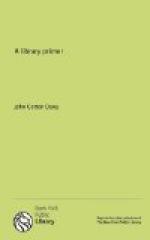Teachers’ cards can be provided which will give to holders special privileges. It is a question, however, if such a system is necessary or worth while. Under the charging system already described any teacher can be permitted to take away as many books as she wishes, and a record of them can be easily and quickly made. To give “teachers’ cards,” with accompanying privileges, is to limit to some extent the rights of all others. And yet teachers may very often properly receive special attention. In a measure they are part of the library’s staff of educational workers. But these special attentions or favors should be offered without proclaiming the fact to the rest of the community. Many cannot see why a teacher should receive favors not granted to all.
Take special pains to show children the use of indexes, and indeed of all sorts of reference books; they will soon be familiar with them and handle them like lifelong students. Gain the interest of teachers in this sort of work, and urge them to bring their classes and make a study of your reference books.
CHAPTER XLIX
How the library can assist the school
Channing Folsom, superintendent of schools, Dover, N.H., in Public Libraries, May, 1898
We have to consider the teacher, the school, the pupil, the home. The teacher is likely to be conservative; to have fallen into ruts; to be joined to his idols; to make the text-book a fetish; to teach a particular book rather than the subject, so that the initiative in works of cooeperation must come from the library side.
If, then, the library is equally conservative, if the librarian and the trustees look upon their books as too sacred or too precious to be handled by boys and girls, the desired cooeperation will never be attained.
In beginning the desired work the librarian must have a well-defined idea of what is to be done and how. There should be a well-defined line of differentiation between material which the school should furnish and that properly belonging to the library province.
Of course all text-books, all supplementary reading matter for classroom use, all ordinary reference books, should be furnished by the school authorities. But the more extensive and the more expensive dictionaries, gazetteers, cyclopedias, and books for topical reference cannot be so furnished. If they are to be used by public school pupils, the library must supply them, and make access to them as easy and as pleasant as possible.




